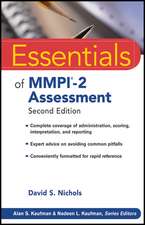The Portable Mentor: Expert Guide to a Successful Career in Psychology
Editat de Mitchell J. Prinsteinen Limba Engleză Paperback – 3 aug 2022
| Toate formatele și edițiile | Preț | Express |
|---|---|---|
| Paperback (2) | 281.80 lei 6-8 săpt. | |
| Cambridge University Press – 3 aug 2022 | 281.80 lei 6-8 săpt. | |
| Springer – 14 sep 2012 | 840.46 lei 6-8 săpt. | |
| Hardback (1) | 772.47 lei 6-8 săpt. | |
| Cambridge University Press – 3 aug 2022 | 772.47 lei 6-8 săpt. |
Preț: 281.80 lei
Preț vechi: 296.64 lei
-5% Nou
Puncte Express: 423
Preț estimativ în valută:
53.92€ • 57.66$ • 44.96£
53.92€ • 57.66$ • 44.96£
Carte tipărită la comandă
Livrare economică 17 aprilie-01 mai
Preluare comenzi: 021 569.72.76
Specificații
ISBN-13: 9781108794381
ISBN-10: 1108794386
Pagini: 450
Dimensiuni: 177 x 257 x 32 mm
Greutate: 1.08 kg
Ediția:Revizuită
Editura: Cambridge University Press
Colecția Cambridge University Press
Locul publicării:New York, United States
ISBN-10: 1108794386
Pagini: 450
Dimensiuni: 177 x 257 x 32 mm
Greutate: 1.08 kg
Ediția:Revizuită
Editura: Cambridge University Press
Colecția Cambridge University Press
Locul publicării:New York, United States
Cuprins
Preface; Part I. Applying to Graduate School: 1. Before you apply to graduate programs in psychology: Knowing when you're ready, and gaining post-baccalaureate experiences Casey D. Calhoun and Mitchell J. Prinstein; 2. Deciding to apply and successfully gaining admission to graduate schools in psychology Mitchell J. Prinstein; Part II. Beginning Your Career: 3. Your first year in graduate school Mitchell J. Prinstein, Kara A. Fox, Nathan H. Field and Olivia H. Pollak; 4. Taking the scientific path: A road map for psychology students Steven C. Hayes and Nicolas M. Berens; 5. Impostor syndrome in graduate school Donte Bernard and Steven Stone-Sabali; 6. Cultural humility in psychology Maysa Akbar; 7. Graduate training for students of color: Belonging required; fitting in, not recommended Keyona Allen, Amanda Parks and Shawn C. T. Jones; 8. Navigating graduate school in psychology as a sexual and/or gender minority (lgbtq+) student Leigh A. Spivey-Rita and Ilana S. Berman; 9. Considerations for first generation students in psychology Casey D. Calhoun, Donte L. Bernard, Luis D. Medina, Evelyn Behar, April R. Smith, Adam Bryant Miller, Angelica M. Diaz-Martinez, Angela Scarpa, Matthew K. Nock, and Mitchell J. Prinstein 10. Developing and practicing ethics Kenneth S. Pope, Nayeli Y. Chavez-Dueñas, and Hector Y. Adames; Part III. Your Research/Academic Career: 11. An open science workflow for more credible, rigorous research Katherine S. Corker; 12. Presenting your research Lindsey L. Cohen , Sarah Martin and Abigail Robbertz; 13. Publishing your research Alan E. Kazdin; 14. Recommendations for teaching psychology William Rando and Leonid Rozenblit; 15. Applying for NIH grants Carl W. Lejuez, Elizabeth K. Reynolds, Will M. Aklin and B. Christopher Frueh; 16. On being a woman in academic psychology Kristen Lindquist, Eliza Bliss-Moreau, June Gruber and Jane Mendle; Part IV. Your Career as a Practitioner: 17. Training to begin a private practice Jeffrey E. Barnett and Elizabeth Henshaw Musewicz; 18. Obtaining a license to practice psychology Corey J. Habben and Jared W. Bollinger; 19. Becoming a specialist: Board certification David R. Cox; 20. Becoming a competent and ethical clinical supervisor Erica H. Wise and Ellen E. Fitzsimmons-Craft; Part V. Your Professional Service Career: 21. Getting involved in professional associations: A gateway to career advancement Daniel Dodgen and Carol Williams-Nickelson; 22. Advocacy: Advancing psychology and public wellbeing Christopher Loftis; 23. Public education of psychology: An Interview with Philip G. Zimbardo, Ph.D. Phil Zimbardo; 24. Working with the media – and getting the media to work for you Kim I. Mills; Part VI. Your Career After Graduate School: 25. Recommendations for navigating the postdoctoral fellowship process Amy Sato, Valerie A. Simon, Elissa Jelalian and Anthony Spirito; 26. Contemporary employment in psychology and future trends Karen E. Stamm, Jessica C. Conroy, Luona Lin and Amrita C. Ghaness; 27. Career possibilities with your doctorate in psychology: Stories from inspiring leaders Antonio Morgan Lopez, Brett Major, Katie Rosanbalm, Muniya Khanna, Ilyse Dobrow DiMarco and Karen Gavin-Evans; 28. Professional women in psychology: Integrating your values into a full life Vicki DiLillo, Le Ondra Clark Harvey, Andrea Hussong, Barbara Kamholz, Elizabeth Lloyd-Richardson and Monica Rivers; 29. The academic job search Robert J. Sternberg; 30. Balancing career and family Paula J. Caplan.
Recenzii
'You go to graduate school. You do research. And then you get a job. If that's what you think, The Portable Mentor is for you. It will show that the process is so much more - more complex, more varied, and even richer and more fulfilling than you might imagine - if you learn from the advice of this diversity of experts.' Mahzarin Banaji, Cabot Professor of Social Ethics, Harvard University, USA
'This book is a wonderful resource for anyone thinking about a career in psychology.' Linda Bartoshuk, Bushnell Professor of Food Science and Human Nutrition and the UFCST Director for Psychophysical Research, University of Florida, USA
'This edition continues to offer sage guidance for all of the steps in developing a career as a psychologist. Importantly, it expands on prior volumes by addressing some of the most critical personal and professional issues and challenges facing young scholars today (e.g., the ubiquitous imposter syndrome; the unique concerns of students of diverse identities). This book is a must-read for all students!' Joanne Davila, Professor, Stony Brook University, USA
'As someone who would never have pursued a career in psychology without the guidance of mentors, I am grateful to Mitch Prinstein for the essential guidance in the third edition of The Portable Mentor. Comprehensive, clear, and engaging, this book offers advice and support to individuals, beginning with when one is first considering graduate training in psychology to one's career in various roles of psychologists. The contributors present diverse perspectives and lived experiences. This edited volume is clearly a work reflecting each of the contributor's dedication to mentoring. Do young people a favor by recommending this book to them.' Sherryl H. Goodman, Samuel Candler Dobbs Professor of Psychology and Director of Graduate Studies, Emory University, USA
'This new edition of The Portable Mentor will transform the face of graduate training programs in Psychology. For first generation students, The Portable Mentor is a necessary roadmap. For underrepresented and minoritized students, this edition lifts the curtain to reveal the true contemporary challenges anticipated to emerge during graduate training and beyond. In fact, this book can guide graduate programs seeking transformation to ensure the diversification of psychological science and a more equitable labor force.' Armando A. Piña, Ph.D., Arizona State University, USA
'This book is a wonderful resource for anyone thinking about a career in psychology.' Linda Bartoshuk, Bushnell Professor of Food Science and Human Nutrition and the UFCST Director for Psychophysical Research, University of Florida, USA
'This edition continues to offer sage guidance for all of the steps in developing a career as a psychologist. Importantly, it expands on prior volumes by addressing some of the most critical personal and professional issues and challenges facing young scholars today (e.g., the ubiquitous imposter syndrome; the unique concerns of students of diverse identities). This book is a must-read for all students!' Joanne Davila, Professor, Stony Brook University, USA
'As someone who would never have pursued a career in psychology without the guidance of mentors, I am grateful to Mitch Prinstein for the essential guidance in the third edition of The Portable Mentor. Comprehensive, clear, and engaging, this book offers advice and support to individuals, beginning with when one is first considering graduate training in psychology to one's career in various roles of psychologists. The contributors present diverse perspectives and lived experiences. This edited volume is clearly a work reflecting each of the contributor's dedication to mentoring. Do young people a favor by recommending this book to them.' Sherryl H. Goodman, Samuel Candler Dobbs Professor of Psychology and Director of Graduate Studies, Emory University, USA
'This new edition of The Portable Mentor will transform the face of graduate training programs in Psychology. For first generation students, The Portable Mentor is a necessary roadmap. For underrepresented and minoritized students, this edition lifts the curtain to reveal the true contemporary challenges anticipated to emerge during graduate training and beyond. In fact, this book can guide graduate programs seeking transformation to ensure the diversification of psychological science and a more equitable labor force.' Armando A. Piña, Ph.D., Arizona State University, USA
Descriere
A one-stop resource for practical, concrete, and honest advice in professional development and how to pursue a career in psychology.
Notă biografică
Mitchell J. Prinstein, Ph.D. is a Bowman and Gordon Gray Distinguished Term Professor and the Director of Clinical Psychology at the University of North Carolina at Chapel Hill. He received his doctorate in clinical psychology from the University of Miami and completed his internship and postdoctoral fellowship at the Brown University Clinical Psychology Training Consortium. Mitch’s research examines interpersonal models of internalizing symptoms and health risk behaviors among adolescents, with a specific focus on the unique role of peer relationships in the developmental psychopathology of depression and self-injury. He is the PI on several past and active grants from the National Institute of Mental Health, the National Institute of Child and Human Development, and several private foundations. He has served as an Associate Editor for the Journal of Consulting and Clinical Psychology, an editorial board member for several developmental psychopathology journals, and a member of the NIH Study Section on Psychosocial Development, Risk, and Prevention. Mitch has received several national and university-based awards recognizing his contributions to research (American Psychological Association Society of Clinical Psychology Theodore Blau Early Career Award, Columbia University/Brickell Award for research on suicidality, APA Fellow of the Society of Clinical Child and Adolescent Psychology), teaching (UNC Chapel Hill Tanner Award for Undergraduate Teaching), and professional development of graduate students (American Psychological Association of Graduate Students Raymond D. Fowler Award).
Textul de pe ultima copertă
Written for students and early career psychologists, The Portable Mentor, Second Edition is a professional development handbook with practical guidelines and suggestions for mastering virtually every professional task encountered during the first decade of a career in psychology. Fully updated and expanded from the first edition this volume covers a wider range of topics and some completely new chapters featuring more detailed information on how and when to apply for graduate school. Comprehensive in scope, but practical in use, The Portable Mentor offers the best possible training from the most successful leaders in psychology, combining the wisdom and mentorship of noted psychology experts into a single source.
Praise for the first edition:
"What a great idea for a book! Edited by two former chairs of the American Psychological Association of Graduate Students (APAGS), this book covers, in a comprehensive fashion, everything about graduate school and career planning a psychologist in training usually learns by word-of-mouth! It's about time someone compiled this crucial information. Whether one is headed for a research or a clinical career, all of the practical steps to get there are included. And, "The Portable Mentor" is an apt description. Every graduate student and young professional will want to have this book readily available."
- David H. Barlow, Ph.D., Professor of Psychology, Research Professor of Psychiatry, Director of Clinical Programs, and Director of the Center for Anxiety and Related Disorders at Boston University
"Prinstein and Patterson have recruited a veritable who's who of psychology to provide us a well-written, scholarly, and comprehensive guide to a successful career in psychology. The volume is filled with critical commentary and issues confronting clinical psychology and with practical and well-reasoned advice on how to negotiate many of the muddy and troubled waters that characterize our field of study in the new millennium. I wish I'd had such a book in my "back pocket" upon my graduation some years ago!"
- Thomas H. Ollendick, Ph.D., University Distinguished Professor, Virginia Polytechnic Institute and State University
"In diverse chapters by active and leading experts, "The Portable Mentor" provides insightful commentaries and bullet-lists of ideas to facilitate early career advancement in psychology. Want to review a research literature, arrange a positive teaching experience, navigate a dissertation? Or perhaps your questions concern practica, internship, licensure, private practice, or board certification or ethics, or being active in service organizations, or even balancing a career and a family. For any and all, and more, "The Portable Mentor" provides pathways to a productive early career. And for those already into their career, advice on how to be a good mentor to our future. Indeed, for psychologists at countless points in their careers, "The Portable Mentor" is a very worthwhile read."
- Philip C. Kendall, Ph.D., ABPP, Laura H. Carnell Professor of Psychology, Temple University
Praise for the first edition:
"What a great idea for a book! Edited by two former chairs of the American Psychological Association of Graduate Students (APAGS), this book covers, in a comprehensive fashion, everything about graduate school and career planning a psychologist in training usually learns by word-of-mouth! It's about time someone compiled this crucial information. Whether one is headed for a research or a clinical career, all of the practical steps to get there are included. And, "The Portable Mentor" is an apt description. Every graduate student and young professional will want to have this book readily available."
- David H. Barlow, Ph.D., Professor of Psychology, Research Professor of Psychiatry, Director of Clinical Programs, and Director of the Center for Anxiety and Related Disorders at Boston University
"Prinstein and Patterson have recruited a veritable who's who of psychology to provide us a well-written, scholarly, and comprehensive guide to a successful career in psychology. The volume is filled with critical commentary and issues confronting clinical psychology and with practical and well-reasoned advice on how to negotiate many of the muddy and troubled waters that characterize our field of study in the new millennium. I wish I'd had such a book in my "back pocket" upon my graduation some years ago!"
- Thomas H. Ollendick, Ph.D., University Distinguished Professor, Virginia Polytechnic Institute and State University
"In diverse chapters by active and leading experts, "The Portable Mentor" provides insightful commentaries and bullet-lists of ideas to facilitate early career advancement in psychology. Want to review a research literature, arrange a positive teaching experience, navigate a dissertation? Or perhaps your questions concern practica, internship, licensure, private practice, or board certification or ethics, or being active in service organizations, or even balancing a career and a family. For any and all, and more, "The Portable Mentor" provides pathways to a productive early career. And for those already into their career, advice on how to be a good mentor to our future. Indeed, for psychologists at countless points in their careers, "The Portable Mentor" is a very worthwhile read."
- Philip C. Kendall, Ph.D., ABPP, Laura H. Carnell Professor of Psychology, Temple University
Caracteristici
Offers concrete advice and instruction on all professional aspects of psychologists’ careers Written by the field’s preeminent leaders in each area of professional competence Includes helpful checklists, instructions, worksheets, and concrete tips to master every aspect of a career in psychology Includes supplementary material: sn.pub/extras














